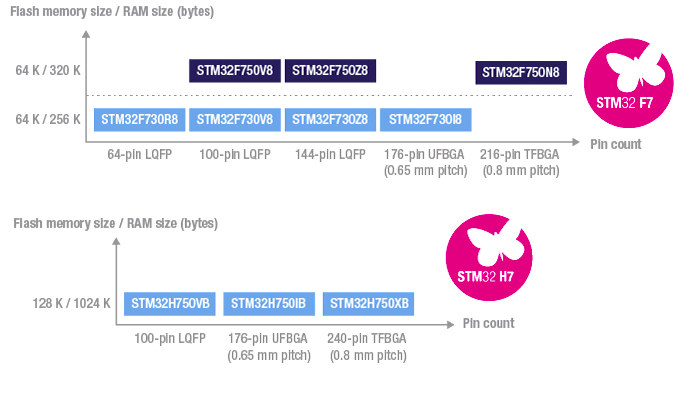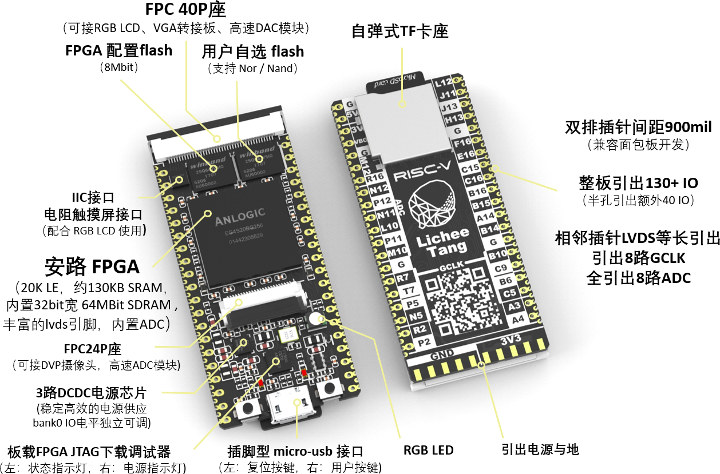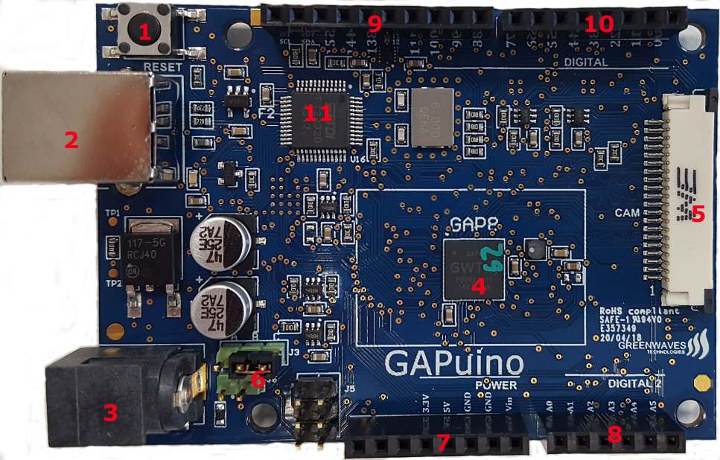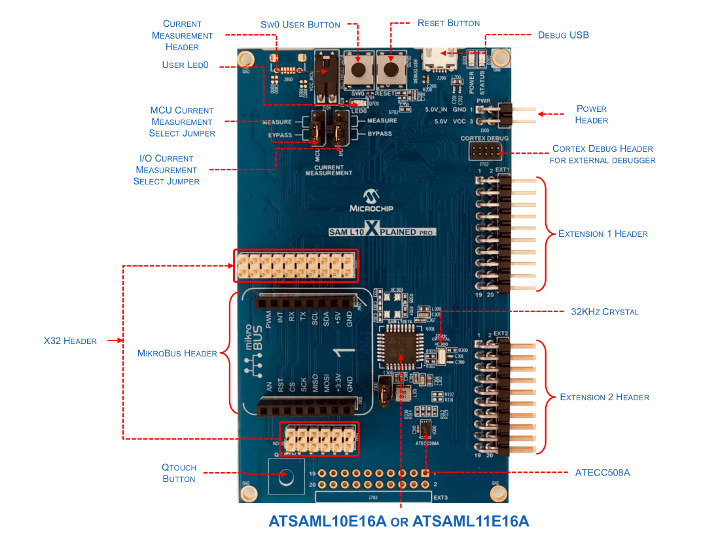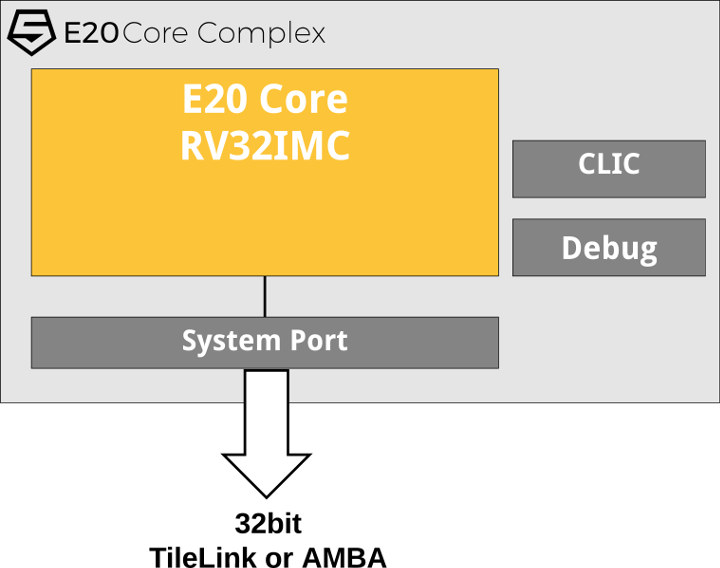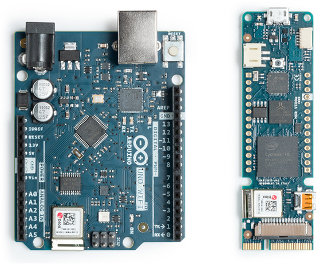STMicro introduces their first Arm Cortex-M7 microcontrollers in 2014 with STM32F7 series clocked up to 200 MHz. The next year, Atmel – now Microchip – announced SAM S70 & SAM E70 Cortex-M7 MCU families clocked at up to 300 MHz, STMicro up the ante to 400 MHz with their STM32H7 family in 2016, and more recently NXP launched their i.MX RT series “crossover” processor with the Cortex-M7 reaching up to 600 MHz. AFAIK, nobody has tried to push the clock speeds higher, but STMicroelectronics most recently unveiled STM32F7x0 & H7x0 Value Line microcontrollers with the same performance level as their earlier STM32F7 and STM32H7 MCUs, but with a lower price by reducing the amount of internal flash. Three Cortex-M7 value line families have been introduced: STM32F730 entry-level MCU @ 216MHz with 64KB flash, 8KB data / instructions cache, 256KB RAM and 16KB+64KB TCM (Tightly Coupled Memory). The microcontroller also includes […]
LicheeTang Anlogic EG4S20 FPGA Board Targets RISC-V Development
LicheePi has already made some interested little development board in the past with products such as LicheePi Zero, and the recently-announced SD card sized LicheePi Nano board, but their latest development board may ever be more intriguing. LicheeTang features Anlogic EG4S20 FPGA – unrelated to Amlogic – which run a RISC-V softcore, and all is packaged in a small small form factor as we’ve come to expect with LicheePi boards. LicheeTang specifications: FPGA – Anlogic EG4S20BG256 with 20K logic unit (LUT4/LUT5 hybrid architecture), about 130KB SRAM, 64MBit SDRAM Storage – 8Mbit flash, micro SD card slot, optional SPI NOR flash Expansion Connectors FPC40P socket for RGB LCD, VGA adapter board, or high speed (12-bit 1MSPS) DAC module FPC24P socket for DVP camera, or high speed ADC module Through holes and castellated holes exposing over 130 I/Os Debugging – FPGA JTAG chip connected over micro USB port Misc – RGB LED […]
GAPUINO GAP8 is a $229 RISC-V MCU Developer Kit for A.I. Applications
GreenWaves GAP8 is a low power RISC-V “MCU class” processor with eight compute cores optimized for artificial intelligence applications, and its main selling point is the ability to do tasks like computer vision or audio processing at very low power, even good enough to run on batteries. When we first covered GAP8 RISC-V processor at the beginning of the year, the company also mentioned a development kit comprised of GAPDUINO Arduino compatible board, a sensor board, and a QVGA camera module to experiment with the solution. The board and development kit are now easier to purchase as the devkit is sold on SeeedStudio for $229. GAPuino board specifications: SoC – GAP8 IoT Application Processor with 8x RISC-V compute cores, 1x RISC-V fabric controller core delivering up to 200 MOPS at 1mW and >8 GOPS at a few tens of mW Memory / Storage – HyperBus combo DRAM/Flash with 512 Mbit […]
LAPIS ML62Q1622 is a General Purpose 16-bit MCU with an LCD Driver
So this morning I received an email about some seminar & workshop about LAPIS microcontroller, including a free ML62Q1622 evaluation board. OK, good. But wait. Who is LAPIS? I have certainly never seen any projects with Lapis MCUs, and probably have never heard of them. It turns out OKI SEMICONDUCTOR Co.,Ltd. established in 2008 from a spin-off of Oki Electric Industry Co., Ltd, changed the company name in to LAPIS Semiconductor Co.,Ltd in 2011. LAPIS is also part of ROHM Semiconductor group. Anyway, it was a good opportunity to find out more about ML62Q1622 micro-controller, and related evaluation boards & tools. Lapis Semi ML62Q1622 is part of ML62Q1600 group of 16-bit microcontrollers whose block diagram is shown above. ML62Q1622 MCU key features & specifications: CPU – 16-bit RISC CPU (CPU name: nX-U16/100) clocked @ up to 32 MHz Coprocessor for multiplication and division Program Memory – 64Kbyte Data Memory – […]
Microchip Unveils SAM L10 & SAM L11 Arm Cortex-M23 MCU Families with Arm TrustZone for Armv8-M
Microchip has recently announced new SAM L10 and SAM L11 Arm Cortex-M23 MCU families, with the SAM L11 family featuring Arm TrustZone for Armv8-M that provides hardware isolation between certified libraries, IP and application code. SAM L10 & SAM L11 MCU Families Key features: Arm Cortex M23 Core @ 32 MHz Up to 64 KB Flash and 16 KB SRAM picoPower Technology less than 25 μA/MHz in active mode less than 100 nA in sleep mode Fast wakeup time: 1.5 μS Flexible power saving features Enhanced Peripheral Touch Controller (PTC) with improved water tolerance, noise immunity and responsiveness Security (for SAM L11 only) Chip-level tamper resistance Arm TrustZone technology Secure boot Secure bootloader Crypto accelerators Secure key storage Op amp ADC and DAC Package – VQFN32, TQFP32, WLCSP32, VQFN24, SSOP24 Microchip SAM L10 MCU achieved a ULPMark score of 405, or over 200 percent better performance compared to the nearest […]
SiFive Announces E20 and E21 RISC-V Cores for IoT and Wearables
SiFive has just announced the availability of their new E2 Core IP Series low-area, low-power microcontroller cores designed for use in embedded devices. Two standards cores are currently part of the new family: E21 providing mainstream performance for MCUs, sensor fusion, minion cores and smart IoT markets E20, the most power-efficient SiFive standard core designed for microcontrollers, IoT, analog mixed signal and finite state machine applications SiFive E20 MCU Core SiFive E20 Standard Core IP Key Features: RISC-V ISA – RV32IMC Machine Mode only 2-stage pipeline System Port for external memory accesses Core Local Interrupt Controller (CLIC) with 32 interrupts Advanced debug with 4 hardware breakpoints/watchpoints Performance – 1.1 DMIPS/MHz; 2.4 CoreMark/MHz Power / Clock / Area 28nm HPC – 0.58 mW; 725 MHz and up; 0.023 mm2 55nm LP – 1.3 mW; 250 MHz and up; 0.064 mm2 The company compares E20 core to Arm Cortex-M0+ core in the […]
Arduino Unveils its First FPGA Board with MKR Vidor 4000, Updates UNO WiFi Board with ATmega4809 MCU
Arduino has been busy with new boards announcements in the last week, as after introducing MKR WiFi 1010 and MKR NB 1500 IoT boards with respectively WiFi + Bluetooth, and NB-IoT + eMTC connectivity, the company has now unveiled two new boards. MKR Vidor 4000 is the very first official Arduino board with an FPGA, while UNO WiFi Rev2 is an upgrade of UNO WiFi board featuring the new Microchip ATmega4809 MCU and an U-blox wireless module instead of an ESP8266 chip. MKR Vidor 4000 Preliminary specifications: FPGA part FPGA – Intel Cyclone FPGA with 16K Logic Elements, 504Kbit of embedded RAM and 56 18×18 bit HW multipliers for high-speed DSP System Memory – 8 MB SDRAM Storage – 2 MB QSPI Flash (1MB for user applications) Micro HDMI connector MIPI camera connector mini PCIe connector with up to 25 user programmable pins MCU – Microchip SAMD21 Cortex-M0+ 32bit low […]
Microsoft Introduces Azure Sphere OS Linux Operating System for Certified Microcontrollers (MediaTek MT3620 for now)
Last year, Microsoft announced they were working with Mediatek on Project Sopris Secure WiFi MCU, based on Mediatek MT7687 MIPS microcontroller with 7 properties enhancing security (Hardware-based Root of Trust, failure reporting etc…). The company has now unveiled a complete secure IoT solution with Azure Sphere comprised of three main components: Azure Sphere certified secured MCUs which combine real-time and application cores with built-in Microsoft security technology and connectivity. The first compatible MCU will be Mediatek MT3620, which differs from MIPS based Project Sopris, as it features one Cortex A7 and two Cortex M4 cores as well as WiFi connectivity. Azure Sphere OS that provides four layers on top of the hardware: security monitor, custom Linux kernel, on-chip connectivity services to Azure Sphere Security Service, and app containers for computer (A7 core) or/and real-time I/Os (M4 cores). Azure Sphere Security Service, a secure cloud service for Azure Sphere device that […]


